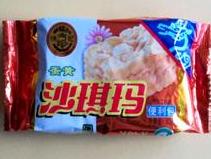DH Chinese version CCTV IP Camera CCTV Ip Camera,Hd CCTV Cameras,Mini CCTV Ip Camera,CCTV Ip Camera System TD Cloud Security Co.Ltd , https://www.cctvcameraexpert.com It is reported that Xu Fuji, a well-known domestic food company, is suspected of illegally adding food additives. The reporter learned yesterday that the Shenzhen Futian District Court had concluded a case a few days ago and found that Xu Fuji's mango crisps and sesame crispy shaqima contained antioxidants that were not allowed by the state to be added to cakes or confectionery products. This behavior has already constituted a consumer Fraud must be compensated. Although Xu Fugui argued that these illegal substances were brought in by raw materials and not artificially added, the court refused to admit it because of lack of evidence.
It is reported that Xu Fuji, a well-known domestic food company, is suspected of illegally adding food additives. The reporter learned yesterday that the Shenzhen Futian District Court had concluded a case a few days ago and found that Xu Fuji's mango crisps and sesame crispy shaqima contained antioxidants that were not allowed by the state to be added to cakes or confectionery products. This behavior has already constituted a consumer Fraud must be compensated. Although Xu Fugui argued that these illegal substances were brought in by raw materials and not artificially added, the court refused to admit it because of lack of evidence.
The reporter learned from the verdict that on August 28th this year, a Guangdong consumer bought three Hsu Fu Ke foods at Shenzhen Carrefour Commercial Co., Ltd., one of which was a mango crisp, with a production date of July 18, 2012; One is sesame-flavored Shaqima, with a net content of 35 grams, and the production date is July 22, 2012. There is also a groundnut-crispy candy, and the production date is January 12, 2012.
The consumer claimed that he discovered after purchasing the food that Xu Fuji’s food was in violation of the problem of adding food additives. In the above-mentioned food product label of Xu Fuji, the label contained food additives TBHQ and BHT. According to the national standard GB2760, two kinds of food additives, tert-butylhydroquinone (TBHQ) and dibutylhydroxytoluene ("BHT"), cannot be added to cakes or confectionery products, "TBHQ and BHT is an antioxidant in food additives that can prevent or delay the oxidative decomposition and deterioration of oils and fats, and improve the stability of foods. In accordance with the "Government Information Disclosure Notification" issued by the Ministry of Health, Wei Zheng Shen Fu [2012] No. 2139, Two food additives cannot be added to cakes or confectionery products."
Subsequently, the consumer sued Carrefour and Xu Fuji to Shenzhen Futian Court, claiming that “Carrefour sold substandard products and constituted fraud,†and at the same time complained that Xu Fuji had produced substandard food.
On November 5, the court openly heard the case.
Regarding the allegation of "infringement of regulations," Xu Fuji argued that the food produced by the company complied with the national standards, and that all of its products were tested and passed before they were sold.
"Products related to TBHQ, BHT use and logo completely in line with national regulations." Xu Fuji explained that its products contain TBHQ, BHT is legal, including mango crisp TBHQ, BHT and sesame crisp Shaqima TBHQ, BHT is brought in by the raw edible oil, while TBHQ in the peanut core sugar is brought into the peanut kernel raw material, and is not artificially added. The company also provided three copies of a certificate issued by the Dongguan City Bureau of Quality Supervision. The intention was to show that the TBHQ and BHT in the products involved were not artificially added but were brought in by food ingredients.
However, the above-mentioned consumers think that “Xu Fuji said that the TBHQ and BHT in the products involved are “insufficient basisâ€. According to GB7718-2011 National Food Safety Standard for Prepackaged Food Labeling, the directly used food additive should be marked in the food additive item, and the non-direct use of food additive should not be included in the food additive item. Xu Fuji said the food packaging. With the labels TBHQ and BHT, it is indicated that these two food additives are used directly.†The consumer also stated that even if TBHQ and BHT as defended by Xu Fuji are not artificially added, the content of the label does not match the food and does not comply with the food. Safety Law.
The reporter learned yesterday from the Shenzhen Futian Court's judgment that the court finally found that Carrefour's sales of foods that did not meet the regulations had constituted fraud. For Xu Fuji’s products, the court held that Dongguan Bureau of Quality Supervision proved insufficient to prove that Xu Fuji’s products did not directly use TBHQ and BHT, and even if these two food additives were brought in as raw materials, it was not artificially added, and it violated the “Food Safety Lawâ€. The relevant provisions of the "food and food additives and labels, instructions contained in the content does not match, shall not be listed on sale" provisions.
The court found out that TBHQ and BHT are listed in the "Standard for the Use of Food Additives" (GB2760-2011), and the permitted scope of use does not include Chinese-style cakes and crisp candy. The “Open Government Information Notice†of the Ministry of Health’s Office of Open Government also replied that TBHQ is the corresponding name for the food additive t-butylhydroquinone, and that confectionery and cakes are not included in the scope of use of the food additive.
The court held that Xu Fuji's labeling of the food additives brought in by the raw materials was inconsistent with the regulations of the country's relevant documents, and its labeling on the product labels involved did not comply with the fact that TBHQ and BHT were added, in violation of the relevant provisions of the Food Safety Law. The consumer must be compensated accordingly.